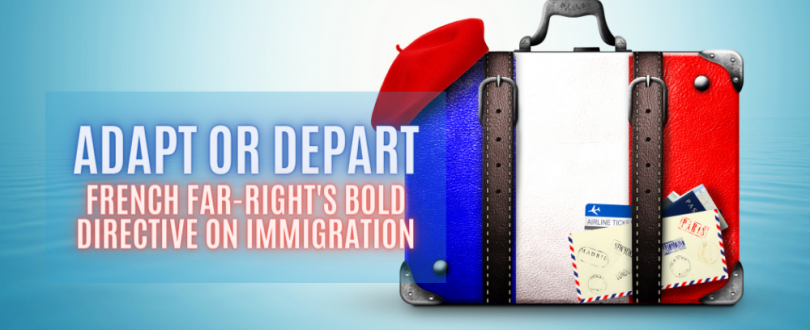
France has always been a beacon for travelers and immigrants alike, offering rich culture, history, and opportunities. However, recent developments in French immigration policy are making headlines, particularly due to a controversial statement by the new Immigration Tsar from the French Far-Right. This article delves into the implications of his statement and provides insights into the evolving landscape of French immigration, particularly for travelers.
France’s immigration policies have long been a topic of debate, especially with the rise of the Far-Right political movement. The Far-Right, known for its stringent stance on immigration, has gained significant influence in recent years. The newly appointed Immigration Tsar, central to this shift, has made a statement that has sparked controversy and debate across the nation.
The Statement: “Get With the Program or Leave”
In a bold and polarizing move, the Immigration Tsar declared that civil servants must align with the new immigration policies or leave their positions. This statement, made during a public address, emphasized the government’s commitment to enforcing stricter immigration controls. The reaction was immediate, with varied responses from political parties, civil servants, and the public.
Implications for Civil Servants
This directive places significant pressure on civil servants working in immigration and related sectors. Those who disagree with the new policies face tough decisions about their careers. The statement also raises questions about the autonomy and impartiality of civil servants, who traditionally serve the state rather than specific political agendas.

Reactions and Criticisms
The statement has elicited strong reactions across the political spectrum. Opposition parties and human rights organizations have criticized it as authoritarian and divisive. Civil servant unions and professional associations have expressed concern about the potential for a hostile work environment and the erosion of professional ethics. Internationally, comparisons have been drawn to other countries’ immigration policies, highlighting the global implications of such a stance.
The Far-Right’s Immigration Agenda
The Far-Right’s immigration agenda includes several key policies aimed at reducing immigration and tightening border controls. These policies could significantly impact immigrants and French society, altering the demographic and cultural landscape of the country. Comparing these proposed changes with previous administrations’ policies provides a clearer picture of the Far-Right’s influence on immigration.
Where Do Most Immigrants in France Come From?
Most immigrants in France come from countries with historical ties to France, such as Algeria, Morocco, and Tunisia. These trends reflect the legacy of France’s colonial past and the ongoing social and economic connections. Understanding these origins is crucial for comprehending the broader context of immigration in France.
Why Do People Migrate to France?
France attracts immigrants for various reasons, including economic opportunities, political stability, and robust social services. Many are drawn to France’s vibrant culture and the promise of a better life. Personal stories from immigrants highlight these motivations, painting a vivid picture of the diverse reasons people choose to make France their new home.
What Level of French is Required for French Citizenship?
French citizenship requires a certain level of language proficiency, typically assessed through standardized tests like the DELF or DALF. These tests evaluate speaking, listening, reading, and writing skills. Numerous resources and programs are available to help immigrants learn French and meet these requirements, facilitating their integration into French society.
Where Are the Refugees in France Coming From?
Refugees in France predominantly come from conflict zones and countries experiencing severe humanitarian crises, such as Syria, Afghanistan, and Sudan. The asylum process in France, while providing a lifeline for many, is fraught with challenges. Understanding the origins and journeys of these refugees underscores the complexity and urgency of global displacement issues.
Historical Context
France’s immigration policies have evolved significantly over the years. The Far-Right’s stance has also transformed, becoming more pronounced and influential. Key historical events and turning points have shaped the current policy landscape, offering insights into the trajectory of French immigration debates.
Potential Outcomes
The new immigration policies could have both short-term and long-term impacts. In the short term, they may lead to increased tensions and adjustments within the civil service. Long-term outcomes could include shifts in France’s demographic makeup and its relationship with the European Union and other international bodies. Political analysts offer varying predictions, but the consensus is that these policies will have profound implications.
The recent statement by France’s Far-Right Immigration Tsar marks a significant moment in the country’s immigration policy. As the debate continues, it is crucial for travelers and observers to stay informed about these developments. Understanding the motivations and origins of immigrants, the requirements for integration, and the broader political context provides a comprehensive view of the situation.

